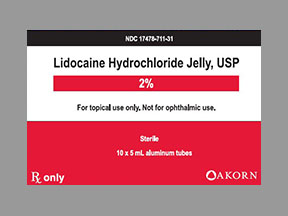
Lidocaine Hcl Urethral/mucosal Coupons & Savings Card – Discount Prices from $1.01
Generic for: Glydo
Lidocaine jelly is a medication designed to prevent and alleviate pain during specific medical procedures, such as tube insertion into the urinary tract. It is also applied to numb the mouth, throat, or nose lining before procedures like intubation. Additionally, it provides relief from pain due to urinary tract swelling, commonly known as urethritis. Lidocaine functions by numbing moist areas of the body and is categorized as a local anesthetic.
Our coupons are free to use. Before paying, show the pharmacist your Lidocaine Hcl Urethral/mucosal savings card to get your free discount. Use our filters below to edit the prescription box to match your needs. The Lidocaine Hcl Urethral/mucosal prices will update based on your prescription needs. Above our Lidocaine Hcl Urethral/mucosal coupons, you can change your location to see pharmacy prices and costs in other areas. We're here to help you buy Lidocaine Hcl Urethral/mucosal at the lowest price with our prescription discount card.
My prescription
Edit
30ML of 2%, Lidocaine Hcl Urethral/mucosal (1 Tube)
Select pharmacy

CVS
$42.49
COUPON PRICE
Walmart
$1.01
COUPON PRICE
Albertsons
$17.40
COUPON PRICE
Walgreens
$17.40
COUPON PRICELidocaine Hcl Urethral/mucosal savings card
Show this card to your pharmacist
Walmart
$1.01
BIN
ID
PCN
GRP
019876
LHC37575C9
CHIPPO
LHX
Powered by
Lidocaine jelly is a medication designed to prevent and alleviate pain during specific medical procedures, such as tube insertion into the urinary tract. It is also applied to numb the mouth, throat, or nose lining before procedures like intubation. Additionally, it provides relief from pain due to urinary tract swelling, commonly known as urethritis. Lidocaine functions by numbing moist areas of the body and is categorized as a local anesthetic.
Our coupons are free to use. Before paying, show the pharmacist your Lidocaine Hcl Urethral/mucosal savings card to get your free discount. Use our filters below to edit the prescription box to match your needs. The Lidocaine Hcl Urethral/mucosal prices will update based on your prescription needs. Above our Lidocaine Hcl Urethral/mucosal coupons, you can change your location to see pharmacy prices and costs in other areas. We're here to help you buy Lidocaine Hcl Urethral/mucosal at the lowest price with our prescription discount card.
Lidocaine Hcl Urethral/mucosal dosage forms
Use our Lidocaine Hcl Urethral/mucosal 30ML of 2% coupon with prices from $1.01 for 1 Tube. You can also use our Lidocaine Hcl Urethral/mucosal 30ML of 2% coupon with prices from $15.61 for 2 Tubes. We have a Lidocaine Hcl Urethral/mucosal 30ML of 2% coupon with prices from $32.90 for 3 Tubes.
Dosage Quantity Price from Per unit 30ML of 2% 1 Tube $1.01 $1.01 30ML of 2% 2 Tubes $15.61 $7.80 30ML of 2% 3 Tubes $32.90 $10.97
| Dosage | Quantity | Price from | Per unit |
|---|---|---|---|
| 30ML of 2% | 1 Tube | $1.01 | $1.01 |
| 30ML of 2% | 2 Tubes | $15.61 | $7.80 |
| 30ML of 2% | 3 Tubes | $32.90 | $10.97 |
